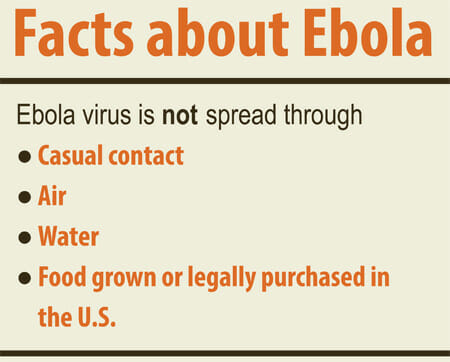 Ebola’s all the rage. Not because we want it to be, but because it scares the hell out of people. It triggers fear, an emotion scammers love to prey on. Let’s look at the facts before getting into the tips.
Ebola’s all the rage. Not because we want it to be, but because it scares the hell out of people. It triggers fear, an emotion scammers love to prey on. Let’s look at the facts before getting into the tips.
The disease
• Ebola symptoms include fever, headache, joint and muscle aches, weakness, diarrhea, vomiting, stomach pain, lack of appetite, and abnormal bleeding.
• Symptoms can appear anywhere from two to 21 days after exposure, but most commonly occur on days 8-10.
• In the US, Ebola is spread through body fluids. In other countries, the disease can also be spread by eating contaminated bush meat or plums eaten by bats that carry the disease.
• People who do not show symptoms are not contagious, but those symptoms can feel a lot like a cold or the flu.
The cures
- At this time, there are no FDA-approved vaccines or drugs to prevent Ebola.
- Any “cures” are still experimental, which means they’re in development. This means there aren’t any approved vaccines, drugs or products that can be purchased online or in stores.
The scams
[mckenna float=right]Am I a medical expert? No. Do I know absolutely, 100%, for sure that there is no Ebola cure? That there is no super-secret stockpile of Ebola vaccines? No. Do I know that there are scammers ready to take advantage of people who suffer from the “You’ve Got to Believe” syndrome? Oh, boy, do I. So, here are five practical tips to avoid what I call Ebola Scareware.
- If it sounds too good to be true, it probably is. Unless your mother was a computer hacker or a con artist, she should have taught you that lesson. Otherwise, she might have said, “If it sounds too good to be true, honey, raise the price.”
- Slick-looking is not the same as legitimate. There are huge numbers of phishing websites designed to convince unsuspecting visitors to give up their personal information or money. Scammers use slick videos, infographics, references, and more to make their sites as convincing as a legitimate site. So, don’t be fooled just because something looks convincing.
- Don’t let fear run your life. I often hear from people who think it’s okay to give up a few dollars in hopes that a miracle cure will work. Their philosophy is, if it doesn’t work, so what? The problem is, this funds the operations of the scammers and during any crisis, the scammers ramp up their operations for one simple reason: during a crisis, consumers make decisions based on emotion, not the facts.
- All natural is not always safe. A common email and internet claim is something to the effect of, “the medical profession doesn’t want you to know about this simple cure!” Hint: there’s usually a reason for that. Just because a remedy is touted as all natural, does not mean that it works or is safe, has been tested, or even contains the ingredients it claims to contain. Claims that the medical profession is deliberately burying a cure for something as serious as Ebola are a sure sign that someone’s hiding something—and I’d bet it’s not your doctor.
- The only miracle will be if you’re not being taken. Most of us will never need a cure for, or medication to prevent us from contracting, Ebola. But, if you think you have Ebola symptoms or need preventative medication, call your doctor. I’m pretty sure a medical professional will have more experience in treating serious diseases than the guy behind the emails flooding our inboxes or the websites cropping up like .

YES, BACKS UP WHAT I THINK.